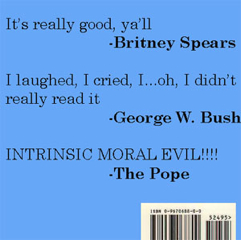Why do I read fiction?
I believe these quotes will answer it for me:
“The overwhelming majority of people go to literature for enjoyment, entertainment, and what we might call the refreshment value of literature. People read literature because they want to, not because they are required to do so.” (Leland Ryken from “Words of Delight: A Hedonistic Defense of Literature”)
“Every good book should be entertaining. A good book will be more; it must not be less. Entertainment is like a qualifying examination. If a fiction can’t provide even that, we may be excused from inquiry into its higher qualities.” (C.S. Lewis from “An Experiment in Criticism”)
As you just read, reading fiction is about enjoyment and refreshment. It’s just like those who like to play sports and exercise, or go out to nightclubs and drink, or watch television or movies or play video games. Entertainment and Pleasure is the main reason for reading fiction.
While writing this post, I began thinking about my favorite novels: David Copperfield by Charles Dickens, The Testament by John Grisham, Home is the Sailor by Jorge Amado, Winter’s Tale by Mark Helprin, & Lost Mission by Athol Dickson and though I have written book reviews (on this blog) and read these novels as a beginning novelist studying from some of the best writers of our modern era. First and foremost, I truly enjoyed reading these novels and it allowed me to enter into their world for a time and when I finished I learned something more about human nature.
Unfortunately, in today’s technological culture, reading fiction is considered useless and a waste of one’s time.
“Through the centuries, the hedonistic defense of literature has had to contend with a utilitarian or functional outlook that belittles anything that is not directly useful in mastering the physical demands of life.” (Leland Ryken from “Words of Delight: A Hedonistic Defense of Literature)
That quote explains the culture’s attitude towards reading fiction. Since it’s not real and it can’t help in my everyday life, it’s not worth spending some of my time on it.
Hmmm….this same culture worships celebrities and professional athletes and know everything about their lives like they are relatives or close friends. Also, we spend time sending text messages and e-mails, posting on Social Media like Facebook and Twitter, or surfing the internet. And I believe those activities are just as much as waste of time than reading fiction.
The bigger point is that people need entertainment and pleasure in their lives. We are not functional beings all the time. God created us to have enjoyment in our lives and appreciate having pleasure as well.
“Behold, what I have seen to be good and fitting is to eat and drink and find enjoyment in all the toil with which one toils under the sun the few days of his life that God has given him, for this is his lot. Everyone also to whom God has given wealth and possessions and power to enjoy them, and to accept his lot and rejoice in his toil–this is the gift of God. For he will not much remember the days of his life because God keeps him occupied with joy in his heart.” (Ecclesiastes 5:18-20 ESV Bible)
Those verses of scripture are from my favorite book in the Bible, Ecclesiastes. Solomon understood that God wanted us to have enjoyment and pleasure in our lives while serving and worshipping Him. Wow! After reading that book changed my outlook on what it is to be a Christian and live a Christian lifestyle.
What’s ironic…in the nearly 10 years since I’ve been a Christian, I have not heard of any pastor doing a study on Ecclesiastes to their congregation. Why is that? Aren’t we supposed to study the entire Bible? (not just Genesis, Exodus, Psalms, Proverbs, the Gospels or Paul’s letters)
I’ve wondered is it because Solomon writes about enjoyment and pleasure so freely and that the book of Ecclesiates isn’t supposed to belong in the Bible according to the Church. Well, he did write the Song of Solomon and that book is not taught from the pulpits either.
Ok…..back to my point!
I know everyone has heard this saying before:
“The truth is stranger than fiction.”
I must admit that phrase has always troubled me over the years and I never truly believed it. Reading fiction has never been about being stranger than reality or even in competition with reality.
“Literature takes reality and human experience as its starting point, transforms it by means of the imagination, and sends readers back to life with renewed understanding of it and zest for it because of their excursions into a purely imaginary realm.” (Leland Ryken from “Thinking Christianly about Literature)
This quote gives the perfect definition of fiction. After you’ve read a work of fiction, it enhances your view reality and creates a deeper insight into human nature.
For example, one of my favorite novels is Home is the Sailor by Jorge Amado. The story deals with the themes of gossiping , storytelling, and a perceived status in society that happened in early 20th Century Brazil.
Moreover, the themes of gossiping, storytelling, and seeking social status are universal because these are things that happen in all cultures. So even though the story takes place in Brazil and the characters are completely made-up, after reading Home is the Sailor I got a deeper understanding about truth. What is truth and does perception create your reality? And it was an entertaining story that made me laugh out loud as well.
This novel is a great example of why I read fiction and I hope more people will take that into account when they read a novel also.


